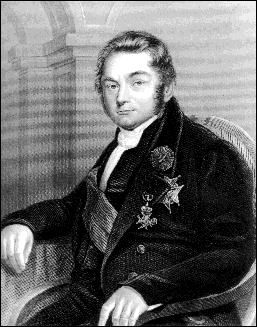Berzelius, Jöns Jackob (1779–1848)

Jackob Berzelius was a Swedish chemist, born in East Gothland, who was among the founders of modern chemistry. While studying for the medical profession at the University of Upsala, Berzelius was more attracted by the preparatory studies in science, especially chemistry. After being employed for time in medical practice and lecturing, he was appointed (1806) lecturer in chemistry in the Military Academy of Stockholm, and, in the following year, professor of medicine and pharmacy. He was shortly after chosen president of the Stockholm Academy of Sciences, and from 1818 till his death held the office of perpetual secretary. The king raised him to the rank of baron; other honors from learned societies were conferred on him, including the London Royal Society's gold medal.
Berzelius was essentially an experimental chemist whose careful observations and measurements helped revolutionize and modernize his science. His accurate analyses established the laws of combination on an incontrovertible basis; and to him we owe the system of chemical symbols. He prepared the first table of relative atomic masses and contributed to the founding of the theory of atomic radicals. He discovered the elements cerium (1803), selenium (1818), and thorium (1829), and first showed calcium, barium, strontium, tantalum, silicon, and zirconium in the metallic (or, in the case of silicon, amorphous) form. He introduced the terms "protein," "isomerism," and "catalysis," and devised the modern method of writing empirical formulae (1813). Of his numerous writings, the most important was a text-book of chemistry (3 vols. 1808–1818), which was translated into every European language.
Berzelius analyzed samples from various meteorites, including, in 1834, the Alais meteorite. In the latter, he confirmed the finding of chemists Thenard and Vauquelin, that carbon compounds were present. He then speculated about the origin of these substances and, in particular, whether they offered proof of life on other worlds (see panspermia). Perhaps influenced by his belief that most meteorites came from volcanic eruptions on the Moon, he was skeptical: "The carbonized substance that this earth [i.e. the meteoritic rock] contains ... would not authorize the conclusion that in its original habitat, this earthy substance was of organic nature."


